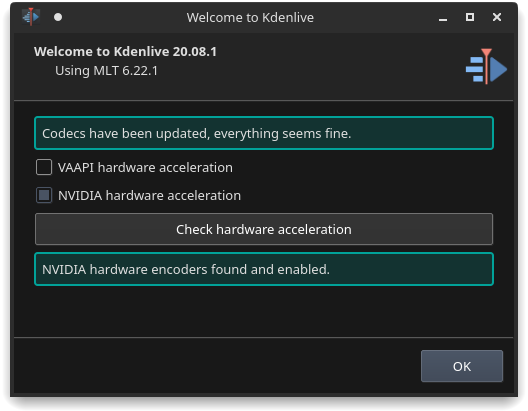I’ve talked to a couple people with similar hardware configs and I asked them to render the same file - an avchd in .mts format, using the same settings (f=mp4 vcodec=nvenc_h264 vb=30000k rc=cbr acodec=aac ab=192k). They report render times of about 0.5x file length, while I am only able to get about 8x file length.
This is INSANE! No corrections, no transitions, no transforms, no effects, a 2min30s file renders in 16 minutes? What am I missing? What am I doing wrong.

System: Kernel: 5.8.11-1-MANJARO x86_64 bits: 64 compiler: N/A
parameters: BOOT_IMAGE=/boot/vmlinuz-5.8-x86_64 root=UUID=8998e854-e616-46ea-bc45-dd6da6ab951f rw
"acpi_osi=Windows 2012" quiet udev.log_priority=3
Desktop: KDE Plasma 5.19.5 tk: Qt 5.15.1 wm: kwin_x11 dm: SDDM Distro: Manjaro Linux
Machine: Type: Laptop System: ASUSTeK product: FX503VD v: 1.0 serial: <filter>
Mobo: ASUSTeK model: FX503VD v: 1.0 serial: <filter> UEFI: American Megatrends v: FX503VD.308
date: 04/29/2019
Battery: ID-1: BAT1 charge: 52.3 Wh condition: 52.3/64.4 Wh (81%) volts: 5.2/15.2 model: ASUS A32-K55
type: Li-ion serial: N/A status: Full
CPU: Topology: Quad Core model: Intel Core i5-7300HQ bits: 64 type: MCP arch: Kaby Lake family: 6
model-id: 9E (158) stepping: 9 microcode: D6 L2 cache: 6144 KiB
flags: avx avx2 lm nx pae sse sse2 sse3 sse4_1 sse4_2 ssse3 vmx bogomips: 20004
Speed: 800 MHz min/max: 800/3500 MHz Core speeds (MHz): 1: 800 2: 800 3: 800 4: 800
Vulnerabilities: Type: itlb_multihit status: KVM: VMX disabled
Type: l1tf mitigation: PTE Inversion; VMX: conditional cache flushes, SMT disabled
Type: mds mitigation: Clear CPU buffers; SMT disabled
Type: meltdown mitigation: PTI
Type: spec_store_bypass mitigation: Speculative Store Bypass disabled via prctl and seccomp
Type: spectre_v1 mitigation: usercopy/swapgs barriers and __user pointer sanitization
Type: spectre_v2
mitigation: Full generic retpoline, IBPB: conditional, IBRS_FW, STIBP: disabled, RSB filling
Type: srbds mitigation: Microcode
Type: tsx_async_abort status: Not affected
Graphics: Device-1: Intel HD Graphics 630 vendor: ASUSTeK driver: i915 v: kernel bus ID: 00:02.0
chip ID: 8086:591b
Device-2: NVIDIA GP107M [GeForce GTX 1050 Mobile] vendor: ASUSTeK driver: nvidia v: 450.66
alternate: nouveau,nvidia_drm bus ID: 01:00.0 chip ID: 10de:1c8d
Device-3: IMC Networks USB2.0 HD UVC WebCam type: USB driver: uvcvideo bus ID: 1-7:4 chip ID: 13d3:5666
serial: <filter>
Display: x11 server: X.Org 1.20.9 compositor: kwin_x11 driver: modesetting,nvidia
alternate: fbdev,intel,nouveau,nv,vesa display ID: :0 screens: 1
Screen-1: 0 s-res: 1920x1080 s-dpi: 96 s-size: 508x285mm (20.0x11.2") s-diag: 582mm (22.9")
Monitor-1: eDP-1 res: 1920x1080 hz: 60 dpi: 142 size: 344x193mm (13.5x7.6") diag: 394mm (15.5")
OpenGL: renderer: Mesa Intel HD Graphics 630 (KBL GT2) v: 4.6 Mesa 20.1.8 direct render: Yes
Audio: Device-1: Intel CM238 HD Audio vendor: ASUSTeK driver: snd_hda_intel v: kernel bus ID: 00:1f.3
chip ID: 8086:a171
Sound Server: ALSA v: k5.8.11-1-MANJARO
Network: Device-1: Realtek RTL8111/8168/8411 PCI Express Gigabit Ethernet vendor: ASUSTeK driver: r8169 v: kernel
port: d000 bus ID: 02:00.0 chip ID: 10ec:8168
IF: enp2s0 state: down mac: <filter>
Device-2: Intel Wireless 8265 / 8275 driver: iwlwifi v: kernel port: d000 bus ID: 04:00.0
chip ID: 8086:24fd
IF: wlp4s0 state: up mac: <filter>
Drives: Local Storage: total: 1.20 TiB used: 470.72 GiB (38.3%)
ID-1: /dev/mmcblk0 vendor: Samsung model: SP64G size: 59.48 GiB block size: physical: 512 B
logical: 512 B serial: <filter> scheme: MBR
SMART Message: Unknown smartctl error. Unable to get data.
SMART Message: Unable to run smartctl. Root privileges required.
ID-2: /dev/sda vendor: A-Data model: SU800NS38 size: 238.47 GiB block size: physical: 512 B
logical: 512 B speed: 6.0 Gb/s serial: <filter> rev: 8BS scheme: GPT
ID-3: /dev/sdb vendor: Seagate model: ST1000LX015-1U7172 size: 931.51 GiB block size: physical: 4096 B
logical: 512 B speed: 6.0 Gb/s rotation: 5400 rpm serial: <filter> rev: SDM1 scheme: GPT
Partition: ID-1: / raw size: 237.97 GiB size: 233.24 GiB (98.01%) used: 32.27 GiB (13.8%) fs: ext4 dev: /dev/sda2
Swap: Kernel: swappiness: 3 (default 60) cache pressure: 50 (default 100)
ID-1: swap-1 type: file size: 10.00 GiB used: 0 KiB (0.0%) priority: -2 file: /swapfile
Sensors: System Temperatures: cpu: 55.0 C mobo: N/A
Fan Speeds (RPM): cpu: 0
Info: Processes: 214 Uptime: 1h 19m Memory: 15.52 GiB used: 2.70 GiB (17.4%) Init: systemd v: 246 Compilers:
gcc: 10.2.0 Packages: pacman: 1275 lib: 422 Shell: Bash v: 5.0.18 running in: konsole inxi: 3.1.05
Upon further testing I noticed that the video engine utilization generally sits at 0% while rendering, with very short, occasion spikes at 10-15%. Just a FWIW…